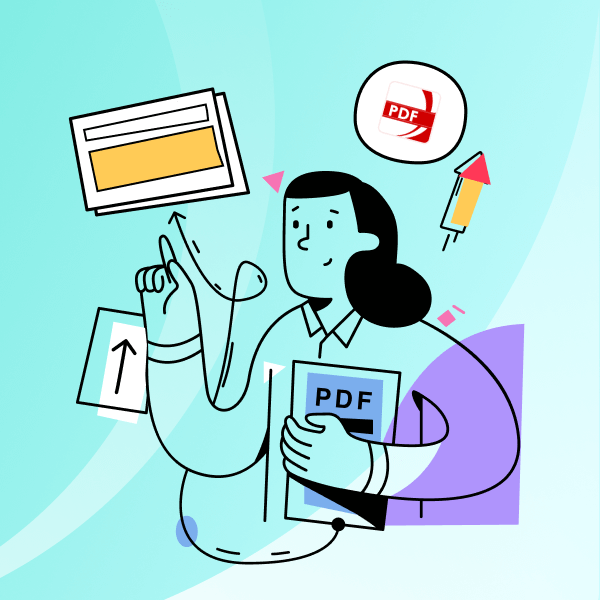When using your phone to view or store PDF files, you might wonder, "Where are PDF files stored on my phone?"
Understanding the storage locations can help you manage your files more efficiently. Here's a guide, specifically tailored for users of the versatile PDF Reader Pro.
How to Find PDFs on Your iPhone
Step 1: PDF Reader Pro
Open the PDF Reader Pro app on your iPhone

Step 2: Documents
Access the Private, iCloud Drive, and Downloads folders from the "Documents" menu

Other Methods for Finding PDF Files on iPhone
Locating a PDF in Apple Books
Apple Books, previously known as iBooks, is a common repository for your PDFs on an iPhone.

Here's a quick guide to finding your PDFs in Apple Books:
- Launch the Apple Books app.
- Tap on the 'Library' option, typically at the screen's bottom.
- Choose the 'PDF' collection. Depending on your settings, Apple Books will display your PDFs or all file types.
Learn how to convert a picture to PDF on your iPhone with our quick and simple guide, making document sharing easier.
Finding a PDF in iCloud Drive
iCloud Drive is another place where your PDFs might be stored.

To locate a PDF in iCloud Drive:
- Open the Files app.
- Navigate by tapping on 'Browse' then 'iCloud Drive'.
- You might need to explore various folders to locate your specific PDF.
- Note: Tapping 'Browse' or 'Locations' may be necessary more than once to reveal the 'iCloud Drive' option.
Finding a PDF in the Files App
The Files app on your iPhone is a comprehensive spot to search for your PDFs.
If the PDF is on your device, it's likely to be found here:
- Start the Files app.
- Tap on 'Browse' and then 'On My iPhone' to view files stored directly on your device.
- Look through your folders for the PDF, starting with the 'Downloads' folder, as it's a common location for new files.

How to Find PDFs on Your Android
Step 1: Open PDF Reader Pro
Open the PDF Reader Pro app on your Android.

Step 2: Documents
Click on "PDF Documents" or "All Documents" to find the document you're looking for.

Other Methods for Finding PDF Files on Android
Discover how to save a Google Doc as a PDF on your iPhone with our straightforward steps, ensuring accessibility and portability.
Check the Downloads Folder
Your Android device has a dedicated Downloads folder where it typically stores all the files you've acquired from emails, messages, or other sources.

Here's how to navigate to your downloads on Android:
- Access your app drawer by swiping up from the bottom of your screen or by tapping the app drawer icon located on your home screen.
- Look for the My Files app (or File Manager). If it's not immediately visible, tap on the Samsung folder; it's the one with several smaller icons. You'll find My Files inside.
- In the My Files app, go to the Downloads section. Here, you will see a list of all your downloaded files.
- If you want to find a PDF quickly, tap the Browse icon at the bottom of your screen.

Learn how to scan documents into PDF format directly from your iPhone with our easy-to-follow guide, enhancing your mobile productivity.
Explore the Documents Folder
Android devices organize all document-related files, such as PDFs, text files, CSVs, etc., in the Documents folder.

To access your documents:
- Open your app drawer by swiping up from the bottom of your screen or by pressing the app drawer icon on your home screen.
- Navigate to the My Files app (or File Manager). If My Files isn't directly visible, open the Samsung folder with multiple smaller icons in it. You'll find My Files there.
- Once you're in the My Files app, head over to the Documents section. This is where all your document files are stored.
- To swiftly locate a specific PDF, use the Browse icon at the screen's bottom.

I use PDF Reader Pro on both my phone and laptop, which easily addresses all my PDF-related needs across devices.

What stands out to me most about PDF Reader Pro are its annotation features; they're incredibly user-friendly and comprehensive, allowing me to easily mark up documents, leave comments, and highlight key points.
This flexibility and functionality make PDF Reader Pro an invaluable tool in my daily workflow, significantly enhancing my productivity and the way I interact with PDF documents.
Check out our guide on how to scan a document on iPhone and Android to streamline your mobile document management.
Where are PDF Files Stored: Best Practices
Navigating the digital landscape of your mobile device to find PDF files can sometimes feel like looking for a needle in a haystack.
Whether you're using an Android device or an iPhone, understanding the best practices for storing and locating your PDF files can save you time and prevent frustration.
Here are some best practices to keep your PDFs organized and easily accessible:
-
Regularly Check the Downloads Folder: This is often the first stop for any file you download from the internet, including PDFs. Periodically reviewing the Downloads folder not only helps you locate recent files but also allows you to clear out any unnecessary files, freeing up storage space.
-
Use the Files App: Both Android and iOS offer a Files app, a centralized place to view and manage all your documents. For iOS users, iCloud Drive is integrated into the Files app, providing a seamless way to access files across devices. Use the search bar or search field within the app to quickly locate specific PDF files.
-
Utilize Internal Storage Smartly: Be mindful of your device's internal storage. Store important PDFs and frequently accessed documents here for quick access. However, remember to backup these files to avoid losing them in case of device failure.
-
Organize with File Manager Apps: File Manager apps can offer more sophisticated organizational tools than the default system apps. They often provide better search capabilities, file sorting, and even integration with various cloud storage solutions. They can be especially useful for managing a large number of PDF files on Android devices.
-
Optimize PDF Downloads: When downloading PDF files, rename them if possible to something descriptive and easy to remember. This practice makes it easier to locate the file later using the search bar in your file manager or cloud storage app.
-
Manage Storage Space: Be aware of how much storage space your PDF files are taking up. Regularly clean out old or unnecessary files.
-
Explore Amazing Features of Your PDF Viewer: While not directly related to storage, knowing the capabilities of your PDF viewer can enhance your experience. Take advantage of features like bookmarks, annotations, and tagging to make navigating and reading your PDFs more efficient.
-
Keep an Eye on Junk Files: Occasionally, PDF downloads might end up in unexpected folders or get duplicated. Keep your storage tidy by regularly checking for and removing these junk files.
By following these best practices, you can ensure that your PDF files are well-organized and easily retrievable, making your interaction with digital documents on your mobile device as seamless and productive as possible.

Where are PDF Files Stored: FAQ
Why can't I find a PDF I downloaded on my phone?
The file might have been saved in an unexpected location. Check your browser's or email app's download history to see the save path. Also, ensure your file management or PDF reader app has permission to access storage.
Are PDF files stored in the cloud accessible from my phone?
Yes, if you use a cloud storage service (like Google Drive or iCloud), and have the corresponding app installed on your phone, you can access PDFs stored in the cloud.
How can I ensure the privacy of PDFs on my phone?
Use apps with encryption and password protection features for sensitive PDFs. Additionally, protect your data by utilizing the security settings on cloud storage apps.
Can I automatically sync PDFs across my devices?
Yes, by using cloud storage services like Dropbox, Google Drive, or iCloud, any PDFs saved in these services can be automatically synced across all your devices with the service installed.
How do I delete PDF files from my phone?
Locate the PDF file using your file manager or PDF reader app, then select the file and look for a delete or trash option. Confirm the deletion to remove the file from your device.









 Free Download
Free Download  Free Download
Free Download





 Support Chat
Support Chat